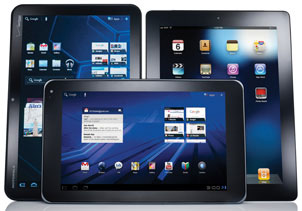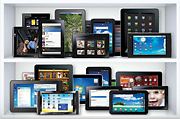4 reasons you don't need to buy a tablet
Tablets are being hailed in the media, but will you necessarily have to buy one?
 Tablets are getting attention for everyone. Images and information about them appear everywhere in the media, and in electronics stores. But, is the tablet really necessary for you?
Tablets are getting attention for everyone. Images and information about them appear everywhere in the media, and in electronics stores. But, is the tablet really necessary for you?
After my experience, the article writer (on the PC World USA) said that the iPad tablet, BlackBerry PlayBook, Samsung Galaxy Tab, Galaxy Tab 10.1, Motorola Xoom . are being exaggerated beyond what they actually do. responsiveness.
To be fair, tablets are suitable for some specific users who are working in certain industries, and in some cases they can be valuable tools for work.
But in general, tablet users have no specific purpose of work when using such a device. In fact, what attracts them is their sleek and stylish appearance, while the internal hardware is very ordinary. There are four reasons below that buying a tablet with you is a luxury, unnecessary.
1) Not convenient for mobile
The tablet is not the perfect mobile device you imagine. You can't simply put it in your pocket like a smartphone. Of course, you can hold the device in your hand like a book, but it is too entangled, and it may cause you to forget somewhere when you put it down. Or worse, you can drop the device, and that's it, everything is shattered. If you use a bag to carry your device regularly with you, then there is something different about carrying a laptop. The laptop is a little bigger, but not much, while the processing capacity for the job is much stronger.
What about smaller? 7-inch tablets are much more portable than iPads or other popular tablets like Motorola Xoom or Samsung Galaxy Tab 10.1. For example, you can fit the BlackBerry PlayBook or the 7-inch Galaxy Tab just behind the pants pocket, which is a convenient way to carry it with you, of course the back pocket must be big enough. But that would be inconvenient to sit down. Because you want to sit, you will have to unplug the device, not to mention that pulling it out will cause scratching of the case.
The catchy image you can't deny is the one-handed tablet and anywhere, with all positions more convenient than a laptop, and comfortable with a much larger screen than a smartphone. But after a period of use, you will see, every time you go out, with a compact smartphone will be more effective than the advantages obtained from the larger screen of the tablet. You can also bring 2 smartphones (in two pockets), and you won't need to take them out if you don't want to.
2) Only additional mobile devices
 Tablets can always stick around with you, but you can't replace your mobile device. You still use smartphones and traditional computers (laptops and desktops) as before, when you don't have a tablet.
Tablets can always stick around with you, but you can't replace your mobile device. You still use smartphones and traditional computers (laptops and desktops) as before, when you don't have a tablet.
That's not to say that tablets can't help you get a better job than laptops, desktops, or smartphones. For example, the Galaxy Tab 10.1 is great when you've just lazily laid back on an armchair while surfing the web while listening to music; It is much more convenient than a laptop, especially when used for a long time, because you can hold one hand, and use the other (finger) to see all the pages (web) to another page. And the larger screen on the tablet lets you experience more comfortable websites than the small screen of smartphones.
But if you have to choose a device to use when going out, the smartphone is probably still more favored, because it is small enough to be portable, and moreover it is used to make phone calls and do everything the computer does. tables can do, on a smaller screen.
If you have to choose just one working tool when sitting somewhere for a long time, you will probably want a laptop because of the large physical keyboard that is easy to use, the screen is also larger and has many good applications. more for work.
That will drown out the desire and lean on the couch and surf the web with the tablet. Laptops help you work more efficiently. Although in some cases, the tablet is more convenient for you, but in general it is not too much.
>>See more .
3) Limited browser
The browser on the tablet still doesn't match the desktop browser, which is why you still prefer to use your laptop to surf the web. In a mobile work environment, you can still use your smartphone to surf the web, and they are more convenient to carry, while the experience is similar to that of a tablet on a smaller screen.
Particularly, the iPad does not support Flash, so if using the iPad, surfing the web will sometimes make you uncomfortable like browsing the web in general, or when compared to other tablets, such as Motorola Xoom, Samsung Galaxy Tab 10.1. and BlackBerry PlayBook.
But even Flash-enabled tablets still have limitations because many popular sites identify their browsers as mobile browsers or do not fully support specific mobile operating systems. For example, both the Webkit browser of BlackBerry Tablet OS and Android 3.1 Chrome fully support Flash and they can play videos online with Hulu.com, but this page blocks the player on BlackBerry and Android tablets. .
Thus, with laptops, you can watch videos on Hulu.com, but are powerless with tablets. The same thing happens with Netflix.com. The lack of Hulu or Netflix makes you somewhat less interested in online entertainment.
4) Lack of durability
 Tablets are vulnerable while operating. Apple iPad is the embodiment of the modern tablet, which is essentially a work of art, sleek, sleek and extremely impressive, and that is the hardware itself. The iPad's software even seems to be "better".
Tablets are vulnerable while operating. Apple iPad is the embodiment of the modern tablet, which is essentially a work of art, sleek, sleek and extremely impressive, and that is the hardware itself. The iPad's software even seems to be "better".
But the iPad is very fragile. That's true, though most iPad users will be eye-catching when they hear this.
Your precious iPad's screen will break if you drop it. Other tablets of course have the same fate if you're careless. Even the BlackBerry PlayBook, one of the most durable tablets on the market today, will break the screen if it falls several times.
This is because: All tablets use a thin glass or something like glass. And glass is naturally fragile. Of course smartphones and laptops can break. But laptops are relatively reliable, they are often folded when not in use, so the screen is better protected. Smaller smartphone screens are more difficult to break. However, if your point of view is that handheld devices must first have an eye-catching form, and a second line of function, then you are more likely to target Apple products.
Each type of tablet is of different quality, and there are a number of good cases that protect your tablet, whether it's a manufacturer or a model. But the reality is that modern tablets are very easy to break down, and that makes them not really effective tools for mobile work or entertainment.
Conclusion: tablets are not for everyone
In summary: Although there is no doubt about the excitement of use and value in some situations and specific environments, tablets are still just a luxury item for most people. Not everyone really needs them, because they don't really provide anything beyond the capabilities of combining smartphones and laptops.
In the future, it is certain that tablets will find their territory in a number of industries, such as medical care, service areas, in-store mobile management . But with a normal employee, perhaps iPads or PlayBooks are all too cumbersome, and not the right solution for them. While they are not cheap, smartphones can provide similar functions.
Tablets, and iPads in particular, are getting too much hype on TV, in magazines and in your favorite movies . It's easy to see that the iPad has made tablets become popular too fast. Apple seems to have succeeded in convincing the majority of users that the iPad is almost a necessity, but that makes us skeptical.
As the tablet market matures, some of the concerns mentioned in the article will certainly be solved to some extent. But the tablet has not been able to replace laptops or smartphones in the near future.
You should read it
- ★ Apple criticizes Android 3.0 'bragging', 7-inch tablet
- ★ Skype supports video calling for Samsung tablets, Motorola
- ★ Samsung's latest Galaxy Tab A tablet offers premium design under $300
- ★ Compare Galaxy Tab S6 and iPad Pro
- ★ Compare the durability of Galaxy Z Flip and Motorola Razr when dropped from a height of nearly 2m